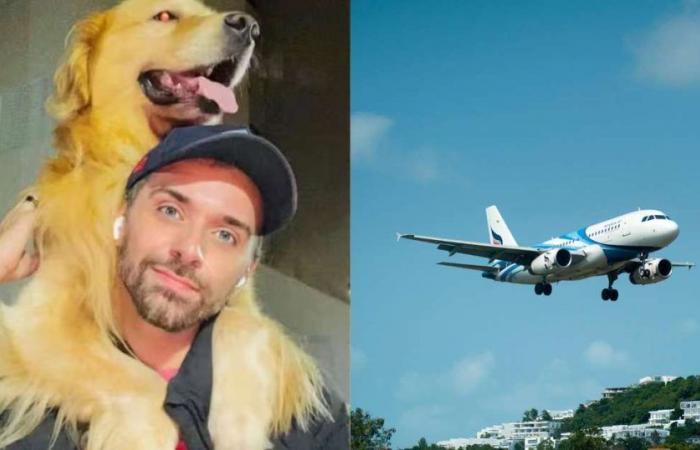On April 22, another tragic incident involving the air transport of animals generated outrage and questions about the safety and care given to pets during travel. The case in question concerns the death of a five-year-old golden retriever, known as Joca, during a Gol flight. The animal, which left the airport in Guarulhos (SP) should disembark with his guardian in Sinop (MT), but was mistakenly sent to Strength (CE), resulting in a grueling journey that culminated in his death.
Joca, a five-year-old golden retriever, died during a flight
Photo: Reproduction/Social Networks and Canva / Perfil Brasil
According to the animal’s owner, a veterinarian had provided a certificate, guaranteeing that Joca would survive a trip of up to two and a half hours. However, as a result of the logistical error, the dog was subjected to almost eight hours of air transport, where, according to the family, he would not have received adequate care from the airline.
The sequence of events that resulted in Joca’s death highlights the urgency in reviewing the laws and regulations that govern the transport of pets on airlines. Currently, large animals are transported alongside cargo, which can expose pets to adverse and stressful conditions, such as: sudden changes in temperature, lack of adequate oxygenation, long periods of confinement and a lot of stress.
Faced with this scenario, it is urgent to implement measures that guarantee the safety and well-being of animals during air transport, either on the initiative of the companies themselves, or through the creation of laws with this determination, after all, for the owners, the pets are part of the family. A possible solution would be to review airline policies to allow the transport of large animals in the cabin, together with their owners, as long as due precautions and safety requirements are observed. It is unacceptable that with all the technology we have, we cannot think of an adequate way to transport animals inside the cabins, alongside their owners.
Until this happens, it is imperative that airlines improve their animal care and monitoring protocols during transport, ensuring that any logistical problems are promptly identified and corrected. This includes implementing real-time tracking systems, adequately training personnel responsible for handling animals, and ensuring transparent communication with owners in the event of incidents.
Another important measure needs to come from the Judiciary, which must begin to truly punish airlines in cases like Joca’s, as R$5,000, an amount that has been arbitrated by many magistrates, does not serve to discourage companies from continuing to follow the same protocols, which have already taken the lives of several pets.
Ultimately, Joca’s death should not be just another preventable tragedy, but rather a call to action to promote legislative reforms and operational practices that guarantee the safety and well-being of all animals that depend on the air transport for your trips. After all, it is up to society and the competent authorities to ensure that incidents like this do not happen again and that the rights of animals and their owners are respected.
*Jennifer Manfrin is a lawyer, specialist in Civil Law and professor of postgraduate courses in Law at Centro Universitário Internacional Uninter.
** This text does not necessarily reflect the opinion of Perfil Brasil.
+The best content in your email for free. Choose your favorite Terra Newsletter. Click here!






